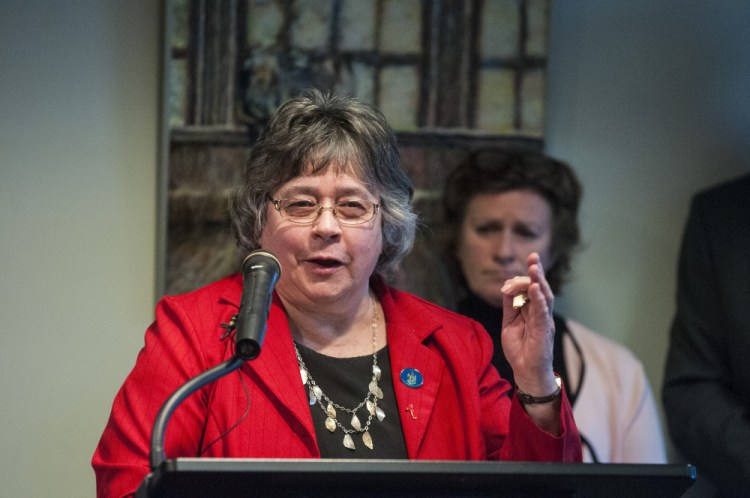Maine residents, lawmakers and health advocates overwhelmingly supported a bill Thursday that would require state government to employ at least 50 public health nurses, who would fill vacancies and nearly double the current workforce.
The bipartisan bill has nine co-sponsors, including seven Republicans and two Democrats. Nearly 40 people testified in support of bolstering Maine’s public health nursing program, whose workforce has been cut in half because the administration of Gov. Paul LePage has not been filling vacant positions.
Sen. Brownie Carson, D-Harpswell, the bill’s sponsor, said that Maine is “hollowing out” a vital public service that could help address the opioid crisis and fight against obesity, smoking and other chronic health conditions.
“We must right this ship,” Carson said at Thursday’s public hearing. The bill will now go before the Legislature’s Health and Human Services Committee for a workshop session within the next few weeks.
Public health nurses are employed by the Maine Center for Disease Control and Prevention, a part of the Department of Health and Human Services. The nurses work on disease prevention by promoting vaccinations and are on the front line during disease outbreaks or other public health emergencies. For instance, the nurses mobilized to help Mainers during the 1998 ice storm.
After childbirth, public health nurses visit mothers and infants to encourage good health practices and help address post-partum depression or other potential concerns related to parenting.
Erin Guay, executive director of Healthy Androscoggin, a nonprofit organization that promotes good health and a former Maine CDC scientist, said Maine is “not prepared for the next infectious disease epidemic” because of the lack of nurses.
“We are not preventing health crises from developing. Public health nurses play an emergency response role, but also a key preventive role. A mounting body of evidence shows that the role of prevention can be greater used to improve health outcomes for us all and will save money,” Guay said.
But the Maine CDC is opposed to the bill, arguing that mandating in state law that Maine must employ 50 public health nurses does not give the executive branch the flexibility to be efficient.
Dr. Christopher Pezzullo, the Maine State Health Officer, said the state currently has 26 public health nurses, and is expected to hire a few more soon to bump up the workforce to 30 full-time equivalents.
“We may have had 50 FTE’s (full-time equivalents) several years ago, but there was only 18 FTE’s of work being done,” Pezzullo said. He said public health nurses are now expected to work more collaboratively with nurses in the community who are not employed by state government, and also to work more within the existing public health system within state government.
Pezzullo said that before the LePage administration, public health nurses were more isolated from the rest of the public health system, and they are now more efficient and effective.
But many others at the hearing said that cuts to public health nursing are damaging and leaving Maine vulnerable.
Rep. Anne Perry, D-Calais, said, “Maine people have suffered and the remaining nursing staff is being stretched to the breaking point. In my part of the state, nurses are putting 1,500 to 2,000 miles a month on their cars trying to meet their responsibilities. And all the time they spend driving is time they aren’t with the people they are supposed to serve.”
Sen. Roger Katz, R-Augusta, said that he has had a “front row seat to the slow starvation of Maine’s public health infrastructure.” Katz said the Legislature funds public health nurses, but the LePage administration refuses to fill vacant positions.
He said the lack of public health nurses could be one of the reasons why infant mortality rates and the percentage of drug-affected babies have increased in recent years.
“We don’t know what the next outbreak or public crisis may be. The key to getting through it is to be prepared and presently, we are not prepared,” Katz said.
Joe Lawlor can be reached at jlawlor@pressherald.com or 791-6376.
Twitter: @joelawlorph
Send questions/comments to the editors.




Success. Please wait for the page to reload. If the page does not reload within 5 seconds, please refresh the page.
Enter your email and password to access comments.
Hi, to comment on stories you must . This profile is in addition to your subscription and website login.
Already have a commenting profile? .
Invalid username/password.
Please check your email to confirm and complete your registration.
Only subscribers are eligible to post comments. Please subscribe or login first for digital access. Here’s why.
Use the form below to reset your password. When you've submitted your account email, we will send an email with a reset code.